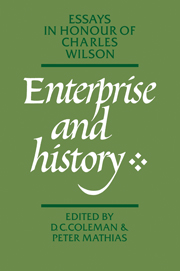Book contents
- Frontmatter
- Contents
- Preface
- List of contributors
- Part I Images and interpretations
- 1 Comparative business history
- 2 Historians and businessmen
- 3 Businessmen and their motives
- 4 La révolution manquée
- Part II England and the Low Countries in pre-industrial times
- Part III Enterprise, finance and politics in the modern world
- Bibliography of Charles Wilson's published works
- Index
2 - Historians and businessmen
Published online by Cambridge University Press: 12 March 2010
- Frontmatter
- Contents
- Preface
- List of contributors
- Part I Images and interpretations
- 1 Comparative business history
- 2 Historians and businessmen
- 3 Businessmen and their motives
- 4 La révolution manquée
- Part II England and the Low Countries in pre-industrial times
- Part III Enterprise, finance and politics in the modern world
- Bibliography of Charles Wilson's published works
- Index
Summary
In May 1960, Harold Nicolson, biographer, journalist, novelist, Member of Parliament and ex-diplomat, recorded in his diary that he had told his son Nigel that ‘I must get a job as a hack-writer who wrote the history of City companies and that I should ask for a fee of £5,000; otherwise I should have to give up living in the Albany.’ In fact he was spared this ultimate descent into literary degradation because his publisher son fixed up a contract for him to write a book for the same fee on the much more socially acceptable topic of monarchy. But the diary entry nicely encapsulated a prevalent British attitude towards the history of business and businessmen: it was not a suitable subject either for the historian or for the literary man. Although Nicolson would not have been aware of it, by 1960 the historian's attitude was beginning to change. That it was so doing owed not a little to the publication in 1954 of the first two volumes of Charles Wilson's History of Unilever. Since then there have appeared a growing number of scholarly books which provide a view of the historical British businessman. What do they say? In particular, what do they say about the character of the big businessman?
Perhaps the most obvious and frequently made comment is that such men were in various ways exceptionally energetic, vigorous, autocratic, dictatorial, dynamic figures who engendered awe, respect or fear rather than affection.
- Type
- Chapter
- Information
- Enterprise and HistoryEssays in Honour of Charles Wilson, pp. 27 - 41Publisher: Cambridge University PressPrint publication year: 1984
- 1
- Cited by



